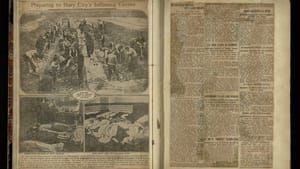Stay in the Loop
BSR publishes on a weekly schedule, with an email newsletter every Wednesday and Thursday morning. There’s no paywall, and subscribing is always free.
A world without vaccines
The Mütter Museum presents ‘Spit Spreads Death’

Spit Spreads Death, a new semi-permanent exhibition from the Mütter Museum, is a retrospective of the 1918-19 flu pandemic that devastated Philadelphia. One century later, major strides in medicine, hygiene, and technology make the gulf between then and now seem greater than a mere hundred years, yet influenza remains a threat. The Mütter puts human faces on an event that is both historical and a living memory, reminding us of the importance of education and understanding in a time when misinformation can circumnavigate the globe even faster than a virus.
The flu in Philly
A funeral-like dirge (an original composition by David Lang, performed by Philly’s The Crossing) plays on a loop when visitors enter the exhibit, where the wall greets them with wartime propaganda exhorting them to buy war bonds to support the troops in the Great War. These images were commonplace in the days leading up to Philadelphia’s Fourth Liberty Loan Drive parade, held to boost bond sales on September 28, 1918. This event drew 200,000 military members and civilians to South Broad Street, and many believed the parade launched the rampant local spread of the infection then known as Spanish Flu (the reason for that moniker is one of many pieces of info you’ll find in this exhibit).
Spit Spreads Death gets its name from the common belief at the time that the virus could contaminate the dirt and dust where spit landed, thereby infecting the air. Public spitting fines could be upwards of a day’s wages. Flu vaccines were still more than twenty years in the future, and several decades away from the effectiveness we enjoy today. Nursing students were pressed into service with minimal training, and the military-style barracks that provided their housing only worsened the spread of the disease. Within six months of the parade, 20,000 people in Philadelphia had died of the flu or its complications.
Still haunted
The most heart-wrenching displays at the Mütter allow users to search victims by name or neighborhood. I found out that four people who share my mother’s maiden name died in the same neighborhood where her immigrant grandparents lived and which my sisters now call home. Another display contains a Christmas gift bought by a young pregnant woman who wouldn’t live to see Halloween, the package still bearing her handwriting on the tag. The past haunts the present in more ways than one.
Front and center in the display is an eight-minute film capturing a September 2019 parade (co-created by the Mütter and the UK-based Blast Theory) held in honor of the flu victims more than a century after the pandemic. Current healthcare workers marched alongside laypeople, all bearing signs with the individual names of hundreds of people who died on October 12, 1918, the peak of the city’s epidemic, when more than 750 people died of the flu in a single day.
Ignorance versus knowledge
My own father has been a nurse nearly as long as I’ve been alive. I grew up knowing how important his job was to keeping people safe, but only through this exhibit have I truly appreciated the risks he knowingly faces when he goes to work during an outbreak.
A century is short, but human memory is shorter. Vaccination is so commonplace now that we’ve nearly forgotten the horror of an unpredictable pandemic. Medical misinformation in 1919 was a desperate attempt to curb an unknown virus. Medical misinformation now demands that ignorance and knowledge be held in equal regard. Spit Spreads Death should be required viewing for anyone who needs a reminder of what a world without vaccines looks like.
What, When, Where
Spit Spreads Death. The Mütter Museum, 19 S. 22nd St, Philadelphia. (215) 560-8564 or muttermuseum.org.
The Mütter is a wheelchair-accessible facility, with ASL interpreters available by request.
Sign up for our newsletter
All of the week's new articles, all in one place. Sign up for the free weekly BSR newsletters, and don't miss a conversation.

 Michelle Nugent
Michelle Nugent